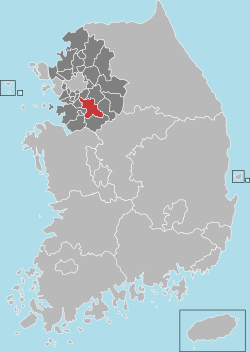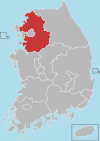Yongin
Yongin
용인시 | |
|---|---|
| Korean transcription(s) | |
| • Hangul | 용인시 |
| • Hanja | 龍仁市 |
| • Revised Romanization | Yongin-si |
| • McCune–Reischauer | Yongin-si |
 | |
 Location in South Korea | |
| Country | |
| Region | Gyeonggi Province (Sudogwon) |
| Administrative divisions | 3 gu, 4 eup, 3 myeon, 35 dong |
| Government | |
| • Type | Mayor-Council |
| • Mayor | Lee Sang-il (People Power) |
| • Council | Yongin City Council |
| Area | |
| • Total | 591.32 km2 (228.31 sq mi) |
| Population (October, 2022) | |
| • Total | 1,076,369 |
| • Density | 1,860.44/km2 (4,818.5/sq mi) |
| • Dialect | Gyeonggi |
| Area code | +82-31-2xx |
Yongin (Korean: 용인; Korean pronunciation: [joŋ.in]) is a city in the Seoul Capital Area, the largest in Gyeonggi Province, South Korea. With a population over 1 million, the city has developed rapidly since the 21st century, recording the highest population growth of any city in the country. Yongin is home to Everland and Caribbean Bay, South Korea's most popular amusement and water parks. The city is also home to the Korean Folk Village, the largest of its kind. Yongin is a multi-nuclear city with multiple urban centers, not a single nuclear structure, and Giheung District crosses the Yeongdong Expressway and Dongbaek, while Suji District crosses Pungdeokcheon Stream and Jukjeon.
Yongin is a city almost as large as Seoul by area, consisting of the highly urbanized districts of Suji District and Giheung District and the semi-urbanized district of Cheoin District. Yongin's urbanized districts are located close to the capital and many commute to and from downtown Seoul in approximately 30–40 minutes by car using the Gyeongbu Expressway or Yongin-Seoul Expressway, the Bundang Line subway, the Shinbundang Line subway or metropolitan buses. The Shinbundang Line with a maximum speed of 110 km/h (68 mph) extended to Suji District in January 2016, which allows Suji residents to travel to Gangnam Station in 25 minutes. The Bundang Line extended south to Giheung Station in December 2011, connecting to EverLine that extends all the way to Everland. In December 2013, the Bundang Line extended to Suwon Station of Seoul Subway Line 1. The 12,000-capacity Yongin Stadium and the 37,000-capacity Yongin Citizen Sports Park Stadium are the largest sports venues in Yongin. Both stadiums are used mostly for football matches.
History
[edit]Although there is evidence of human settlement here as far back as the fifth century, Yongin was granted city status only in March 1996.
Geography
[edit]Yongin has an inland location in the southern part of Gyeonggi province.
Climate
[edit]Yongin has a humid continental climate (Köppen: Dwa) due to its inland location. The average yearly temperature is 11.6 °C, the average temperature in January is -3.1 °C, the average temperature in August is 25.1 °C, and the average yearly precipitation is 1,300mm.
| Climate data for Pogok-eup, Cheoin-gu, Yongin (1994–2020 normals) | |||||||||||||
|---|---|---|---|---|---|---|---|---|---|---|---|---|---|
| Month | Jan | Feb | Mar | Apr | May | Jun | Jul | Aug | Sep | Oct | Nov | Dec | Year |
| Mean daily maximum °C (°F) | 2.6 (36.7) |
5.7 (42.3) |
11.7 (53.1) |
18.5 (65.3) |
23.9 (75.0) |
27.8 (82.0) |
29.2 (84.6) |
30.1 (86.2) |
26.0 (78.8) |
20.1 (68.2) |
12.2 (54.0) |
4.4 (39.9) |
17.7 (63.9) |
| Daily mean °C (°F) | −3.1 (26.4) |
−0.4 (31.3) |
5.2 (41.4) |
11.4 (52.5) |
17.1 (62.8) |
21.7 (71.1) |
24.7 (76.5) |
25.1 (77.2) |
19.8 (67.6) |
12.9 (55.2) |
5.8 (42.4) |
−1.3 (29.7) |
11.6 (52.9) |
| Mean daily minimum °C (°F) | −8.5 (16.7) |
−6.0 (21.2) |
−1.0 (30.2) |
4.9 (40.8) |
10.9 (51.6) |
16.5 (61.7) |
21.0 (69.8) |
21.3 (70.3) |
15.3 (59.5) |
7.4 (45.3) |
0.5 (32.9) |
−6.4 (20.5) |
6.3 (43.3) |
| Average precipitation mm (inches) | 17.2 (0.68) |
31.6 (1.24) |
40.3 (1.59) |
75.6 (2.98) |
89.4 (3.52) |
123.5 (4.86) |
374.6 (14.75) |
290.3 (11.43) |
130.7 (5.15) |
50.1 (1.97) |
47.2 (1.86) |
21.4 (0.84) |
1,291.9 (50.86) |
| Average precipitation days (≥ 0.1 mm) | 4.3 | 4.1 | 5.9 | 7.2 | 7.2 | 7.6 | 13.6 | 13.0 | 8.3 | 5.0 | 7.1 | 5.6 | 88.9 |
| Source: Korea Meteorological Administration[1] | |||||||||||||
Education
[edit]Yongin has many university campuses, namely Yong-In University, noted for its sports courses, Myongji University's Yongin Campus, Hankuk University of Foreign Studies' Yongin Campus, the Police University, Kangnam University (named for its former campus in Gangnam District, Seoul), Yong-in Songdam College, Dankook University and Calvin University.
Administrative districts
[edit]The city is divided into three gu (districts):
Demographics
[edit]| Year | Pop. | ±% p.a. |
|---|---|---|
| 1966 | 105,179 | — |
| 1970 | 96,551 | −2.12% |
| 1975 | 111,442 | +2.91% |
| 1980 | 135,537 | +3.99% |
| 1985 | 153,767 | +2.56% |
| 1990 | 187,975 | +4.10% |
| 1995 | 242,048 | +5.19% |
| 2000 | 384,741 | +9.71% |
| 2005 | 686,842 | +12.29% |
| 2010 | 847,138 | +4.28% |
| 2015 | 971,327 | +2.77% |
| 2020 | 1,089,087 | +2.32% |
| 2022 | 1,092,840 | +0.17% |
Yongin's population surpassed the 1 million mark in 2017.
Transportation
[edit]Yongin is served by trains on the Seoul Metropolitan Subway. The Bundang Line has been extended into Yongin, calling at Jukjeon, Bojeong, Guseong, Singal, Giheung and Sanggal stations; and it has been extended towards Suwon Station, in Suwon. Since May 2013 a new line named the EverLine Rapid Transit System is in operation and linked to the Bundang Line at Giheung Station where it is possible to transfer between lines without going outside. From 2016 onwards, the inner Suji area will also be served by four new Shinbundang Line stations,[2] which will allow Suji residents travel to Gangnam Station in less than 30 minutes.
Yongin has an intercity bus terminal in the city centre, though the densely settled northern areas are served better by the terminal in Yatap-dong, Seongnam.
Food
[edit]Yongin's most famous food is the Sundae of Baekam-myeon, Chouin-gu. Baekamsundae has a special feature of filling meat without blood.
Sports
[edit]Yongin is the home of the WKBL women's basketball team Yongin Samsung Life Blueminx.
Sister cities
[edit]| City | Region | Country | Year |
|---|---|---|---|
| Fullerton | |||
| Yangzhou | Jiangsu | ||
| Fergana Region | 2008 | ||
| Kota Kinabalu | 2000 | ||
| Kayseri | Kayseri Province | ||
| Redland City |
Notable people from Yongin
[edit]- Eunkwang – singer and actor, member of K-pop group BtoB
- Sungjae – singer and actor, member of K-pop group BtoB
- Hyungsik – singer and actor, member of K-pop group ZE:A
- Bomin – singer and actor, member of K-pop group Golden Child
- Mino – rapper and producer, member of K-pop boygroup Winner
- Sungyeol – singer and actor, member of K-pop group Infinite
- Chan – singer and actor, member of K-pop group iKon (Originally from Songpa District, Seoul)
- Changbin – rapper, singer and producer, member of K-pop group Stray Kids and producing team 3Racha
Attractions
[edit]- Everland theme park
- Caribbean Bay water park
- Korean Folk Village
- Munhwa Broadcasting Corporation (MBC) Dramia located at Cheoin District, is the filming location of historical dramas such as Moon Embracing the Sun, Jumong, Queen Seondeok and Dong Yi. Viewing tours are available, which includes traditional folk games, historical court dress and archery.[3]
Gallery
[edit]-
Gugal-dong Yongin
-
Tancheon
-
Overall view of Yongin city hall
-
New Start Like University
See also
[edit]References
[edit]- ^ "Climatological Normals of Korea (1991 ~ 2020)" (PDF) (in Korean). Korea Meteorological Administration. Archived from the original (PDF) on 29 January 2022. Retrieved 7 June 2023.
- ^ "Shinbundang Line Map". Archived from the original on August 27, 2011. Retrieved 25 July 2011.
- ^ Lee, Cin Woo (16 March 2012). "Beyond Seoul: 19 reasons to explore Korea". CNN Go. Archived from the original on 21 April 2012. Retrieved 6 May 2012.







